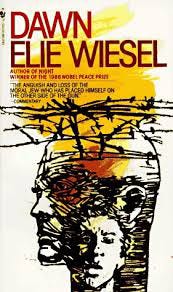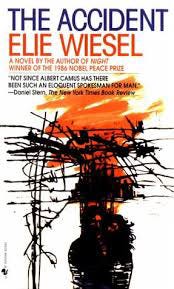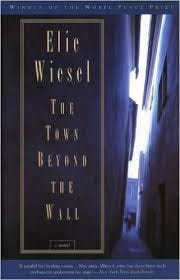Before I begin on this torturous essay, I welcome our next guest John Halbrooks who, scholar and generous heart, writes
The Survivor Dilemma
Thomas Friedman in The New York Times quotes Confucius: “‘Before you embark on a journey of revenge, dig two graves’ — one for your enemy and one for yourself.”
And so, I return to the early novels by Elie Wiesel to reveal the survivor’s dilemma that stands universal. I discussed first ➡️ Night.
As I continue, we learn that a man’s past and future will be tortured by the survivor dilemma—whether it be Jew or Palestinian.
Wiesel leads us to understand in these early novels.
In Dawn, we see that neither the horrors of life nor the struggle with God end with liberation from the concentration camp. Elisha is an eighteen-year-old man who comes to Palestine to fight for the liberation of Israel. As a member of the Liberation Movement, he is to kill at dawn, John Dawson, an English officer. Dawson is being held as hostage for David ben Moshe, a Jewish revolutionary who will die at dawn at the hands of the English.
“Don’t judge me. Judge God. He created the universe and made justice stem from injustice. He brought it about that a people should attain happiness through tears, that the freedom of a nation, like that of a man, should be a monument built upon a pile, a foundation of dead bodies ….”
He meets John Dawson.
“There was something age-old in our situation. We were alone not only in the cell, but in the world as well, he seated, I standing, the victim and the executioner. We were the first—or the last—men of creation; certainly we were alone. And God? He was present somewhere. Perhaps He was incarnate in the liking with which John Dawson inspired me. The lack of hate between executioner and victim, perhaps this is God.”
The irrationality of his situation is impressed upon him. He asks,
“Why do I try to hate you, John Dawson? Because my people have never known how to hate. Their tragedy, throughout the centuries, has stemmed from their inability to hate those who have humiliated and from time to time exterminated them. Now our only chance lies in hating you, in learning the necessity and the art of hate.”
The irrationality is tantamount as we are left with the thought that the oppressed becomes the oppressor.
The Accident (Le Jour in the original) poignantly portrays the inability of a man, who has survived the camps, to live in the present, let alone prepare for a more hopeful future. The narrator of this novel is an Israeli correspondent at the United Nations who is struck by a taxi on a New York street. As he recuperates from the accident we learn that past remembrances of Nazi terror have stifled his life, led him vituperatively to abuse God, and indeed to desire his own death. The man who fought for a future Israel in Dawn becomes a corpse of a man in The Accident.
The epigraph of the novel underlines the overwhelming power of the past:
“I was once more struck by the truth of the ancient saying: Man’s heart is a ditch full of blood. The loved ones who have died throw themselves down on the bank of this ditch to drink the blood and so come to life again; the dearer they are to you, the more of your blood they drink.” —Nikos Kazantzakis, Zorba the Greek
The narrator is unable to live a life in the present.
“Anyone who has seen what they have seen cannot be like the others, cannot laugh, love, pray, bargain, suffer, have fun, or forget. Like the others. You have to watch them carefully when they pass by an innocent looking smokestack, or when they lift a piece of bread to their mouths. Something in them shudders and makes you turn your eyes away. These people have been amputated.”
He tries to hide his suffering with silence, but his silence is ominous and reveals to others that “what counts is the past.” He concludes that “a man wo has suffered more than others and differently, should live apart”—apart from life, love, and God.”
Weisel’s narrator in The Accident sees self-torture.
“Man prefers to blame himself for all possible sins and crimes rather than come to the conclusion that God is capable of the most flagrant injustice.”
He welcomes death. The significance of the accident lies in the fact that the narrator has seen the taxi that struck him. He chose not to avoid it. This suicidal inclination was not momentary. It stays …
In The Town Beyond the Wall, the central character, Michael, resumes the dialogue with God, so vehemently rejected by The Accident. Although the future is uncertain, there is hope for Michael and there is meaning. Michael meets a man named Pedro, becomes friends with him, and learns that this man can smuggle him into the city of his birth in Hungary.
He wishes to see once again the faces of those who watched passively while the Jews were collected for slaughter and captivity. Once in the city, he is captured by the Soviet police and tortured by being compelled to stand for three days in a vertical box. The police want the name of the person who helped Michael. Michael refuses to betray Pedro and eventually is placed in a cell with two other men. During the three days of “praying,” what the police call his torture, for Jews pray standing, Michael reviews his life and his beliefs.
Michael never ceased resenting Job.
That Biblical rebel should never have given in.
At the last moment he should have reared up, shaken a fist, and with a resounding bellow defied that transcendent, inhuman justice in which suffering has no weight in the balance.
He wanted to pit himself against the angel as Jacob had: fell him with a blow, transfer him. One gesture, just one, but a gesture in proportion to his misery.
What Michael has learned is evident in his words:
“I know … it isn’t easy to live always under a question mark. But who says that the essential question of man has an answer? The essence of man is to be a question, and the essence of the question is to be without answer.”
But the way to live under this question mark is to cling to humanity and not to attempt to transcend human potential:
“It’s in humanity itself that we find both our question and the strength to keep it within limits—or on the contrary to make it universal. To flee to a sort of Nirvana—whether through a considered indifference or through a sick apathy—is to oppose humanity in the most absurd, useless and comfortable manner possible. A man is a man only when he is among men. It’s harder to remain human than to try to leap beyond humanity.”
Having read and lived Wiesel’s first four novels, I have seen the mystic child lose his faith and his desire for life. But I’ve also seen him struggle with courage to regain that life and belief in God. I have seen him relive his past and pay homage to those burned in the pits of the concentration camps.
The tragedy and dignity of the man, though enveloped with memories of horror, is able to say to all men who have suffered and all men who remember, as Wiesel says in The Town Beyond the Wall:
“I know: the paths of the soul, overgrown, often know only night, a very vast, very barren night, without landscapes. And yet I tell you: we’ll get out. The most glorious works of man are born of that night.”
Today, anti-Semitism raises its head and threatens to destroy not only the Jews, but us all.
Who is the oppressed and who is the oppressor? As Hamas and Israel dance the deadly Do-si-do, all who live stand in the desert of the survivor’s dilemma.
We must, as Wiesel says, “remain human” and find an answer that recognizes the humanity of Israelis and Palestinians.
Mary Tabor writes
Bibliography











Thanks for this thoughtful essay, Mary. I've been sitting with this for a few days: "all who live stand in the desert of the survivor’s dilemma." It's a very interesting way of framing the Gordian Knot in Israel and Gaza. This conversation, like the meta debate about Substack and free speech, seems to have hardened in ways that make it difficult for me to engage. I've been mainly listening, learning, trying to see what I think and how I feel. Remaining human, for me, means resisting the binaries. But my academic life degenerated into binaries, a version of this crept into my marriage, and now the Substack platform itself seems to be moving into two sides. You offer a welcome alternative.
Mary, you write, as always with such feeling and empathy, especially about the tortures of conscience and the struggle to retain humanity in a world of such unfathomable cruelty. Wiesel, I know, and we all read, is an important writer, thinker, and personage to you. I’ve shared that he’s important to me. He and my father were born just 200 miles from each other, though Weisel, younger, still remained to face the Holocaust as a child when my father had escaped it. I’m very struck by these lines:
---
“The essence of man is to be a question, and the essence of the question is to be without answer.”
But the way to live under this question mark is to cling to humanity and not to attempt to transcend human potential:
“It’s in humanity itself that we find both our question and the strength to keep it within limits—or on the contrary to make it universal. To flee to a sort of Nirvana—whether through a considered indifference or through a sick apathy—is to oppose humanity in the most absurd, useless and comfortable manner possible. A man is a man only when he is among men. It’s harder to remain human than to try to leap beyond humanity.”
---
This is a profound insight. I don’t think Wiesel would have argued against the transcendence that arises from taking the longer, higher view over the scope of human aspiration and suffering, to gain sight of that diminished aspect of each of our appearances in this world. That’s a necessary perspective, too, I think. Most people, evidence repeatedly reveals, know little of the history of the world they live in, still less as the clock winds further back, and it commonly shows in how they respond to the present. But Wiesel’s injunction, through Michael’s words, to remain a human living among humans, is a complementary command to face and see the world for what it is. How could Wiesel not believe that? Is it not what he did so courageously, for us, the remainder of his life?
I think Friedman’s invocation of Confucious about revenge is too easy and off the mark. Do many people feel the rage of outrage that can lead to it among people? It would be ridiculous to say not. However, it isn’t individual people but rather a nation and a government that is pursuing the present course, and mistaken or not, they tend to act from a perception of their self-interest and preservation.
I share your hope for directions that preserve the humanity of both Israelis and Palestinians, fully, equally. My own longer view, not unique, is that those directions aren’t coming, to be maintained with consistency, any time soon. But I believe, like Wiesel, in maintaining a commitment to values even while despairing – maybe most importantly then. I had occasion to say in the comments of an Israeli Substack yesterday that after two thousand years of it, Jews know something about surviving, believing, and dreaming. That needs to continue.